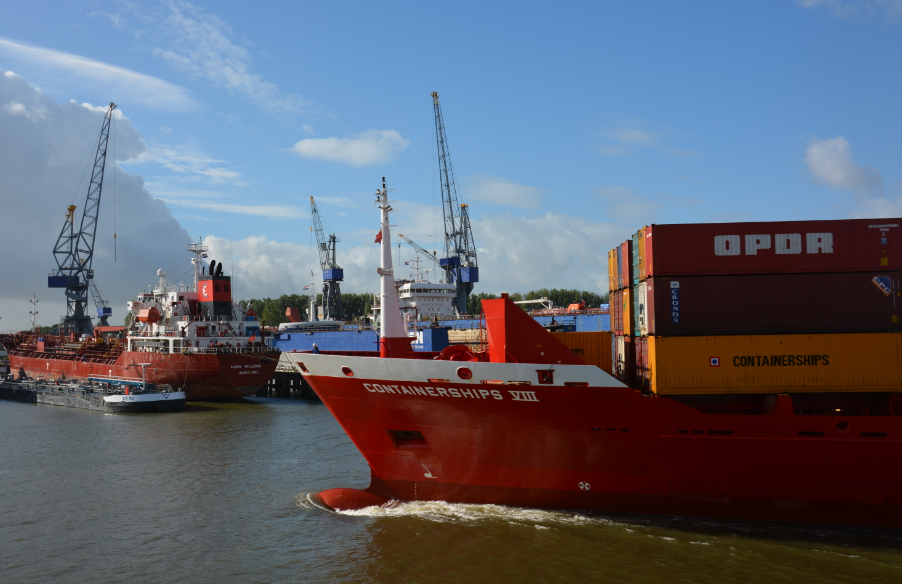
The Dutch Port of Rotterdam, Europe’s largest sea port, saw a 9.1 per cent decrease in its throughput in the first half of 2020 as a result of the economic impact of the COVID-19 pandemic.
Total throughput stood at 218.9 million tonnes in H1 2020, compared to 240.9 million tonnes seen in the corresponding period a year earlier, which was a throughput record at the time.

Global lockdowns have led to less production, consumption and trade. As a consequence, there has been less throughput of many types of goods in the port. In addition, some structural developments are still being felt, in particular the decline in the use of coal for energy and the decline in the trading of fuel oil between Europe and Asia. There was a slight reduction in container throughput, too. On the other hand, LNG and biomass throughput grew in the first half of the year.
“The Dutch economy and the port of Rotterdam are dependent on developments in world trade. The negative economic impact of the COVID-19 pandemic is being felt worldwide. It should therefore come as no surprise that throughput volumes in the past six months were considerably lower than in the same period last year,” Allard Castelein, CEO of the Port of Rotterdam Authority, commented.
“On the positive side, the throughput volumes in the second quarter turned out to be better than initially expected.”
Despite COVID-19 hurdles, the Port of Rotterdam remained 100 per cent operational in the first six months of this year.
Dry bulk
The throughput of dry bulk amounted to 30.8 million tonnes, 19 per cent less than in the first half of 2019. Dry bulk accounts for 14 per cent of throughput in the port of Rotterdam. Falling volumes were seen primarily in the throughput of iron ore and scrap.
A low gas price meant that more gas and less coal was used for power production. In addition, favourable weather conditions meant that there was an increase in the available wind energy, reducing the need to switch to coal-fired power stations.
There was a sharp increase of 109 per cent in biomass due to the continued rise in co-firing in power stations.
Liquid bulk
Liquid bulk throughput amounted to 99.8 million tonnes. That is approximately 10 million tonnes less than in the first half of 2019, a fall of more than 9 per cent. Liquid bulk accounts for 46 per cent of throughput in Rotterdam.
Mineral oil products volumes fell sharply (-22 per cent). In the case of crude oil, the fall was only slight (-4 per cent) and LNG throughput actually increased slightly (+2.6 per cent). Throughput of other liquid bulk in the first half of the year matched the level of last year.
The COVID-19 pandemic led to a further drop in the gas price, making it appealing to use LNG from the North Sea and Atlantic Ocean for power production in Europe.
Containers and break bulk
Container throughput was only 3.3 per cent down on 2019 — or 7 per cent in TEU. That is 2.5 million tonnes less cargo.
Shipping companies cancelled up to 20 per cent of all their services in May and June. The decline in throughput was nevertheless less pronounced due to the increased call sizes of vessels calling at Rotterdam. The number of empty containers was considerably lower than in the same period last year because imports of containers from Asia have fallen while exports have actually risen.
Break bulk fell by 11 per cent in the first half of 2020. RoRo throughput was 12 per cent lower. Most of the drop was at the beginning of the second quarter, when the lockdown was in place in most of Western Europe. Volumes increased again towards the end of the quarter.
Investments will continue despite COVID-19
From January to June 2020, revenue increased 0.7 per cent to € 360.4 million.
The result on ordinary activities before tax for the first half of 2020 was € 128.4 million, a decline of 4.8 per cent by comparison with the first half of 2019. A result after tax of € 98.1 million was booked in the first half of 2020.
Gross investments in the first half of 2020 amounted to € 136.4 million. The Port of Rotterdam Authority has deliberately chosen to continue investing in the Port Industrial Complex during the COVID-19 period.
The most important investments for the first half of 2020 were the construction of the Theemsweg Route, the construction of the Container Exchange Route and the extension of Maasvlakte Plaza.
The level of investment for the whole of 2020 is expected to be in line with last year’s amount of € 338.3 million.
Partly at the request of the central government, the port authority has reviewed investment projects that can both make the Netherlands more sustainable and accelerate the recovery of the economy — Starter Motor.
Specifically, the Starter Motor cuts two ways — it accelerates forward-looking investments in growth and earning capacity while also accelerating the energy transition and efforts to make the economy more sustainable. Examples of Starter Motor projects are the construction of a hydrogen network, the roll-out of shore power and the construction of a heat roundabout.
“(I)t is not in Rotterdam’s nature to sit back and watch. That is why the Port Authority has conducted a review to determine which public-private investment projects can be accelerated. In that way, the government and the port of Rotterdam can team up to further the sustainability of the economy, while giving it a kick-start at the same time,” Castelein continued.
Outlook
According to the port authority, there is considerable uncertainty about how long the recession will last and when recovery will begin. The recovery of the world economy depends very much on whether there will be a second wave of virus infections.
Another factor is whether the EU and the UK will manage to conclude a post-Brexit trade agreement in the coming months. A cautious recovery of the economy is expected in the rest of the year.
“As a result, volumes in the port will not decline further but there will probably be no full recovery of volumes. The total throughput volume for the whole of 2020 is therefore currently expected to be significantly lower than in 2019,” the port authority added.
The post Port of Rotterdam feels impact of COVID-19 on cargo volumes appeared first on Offshore Energy.
